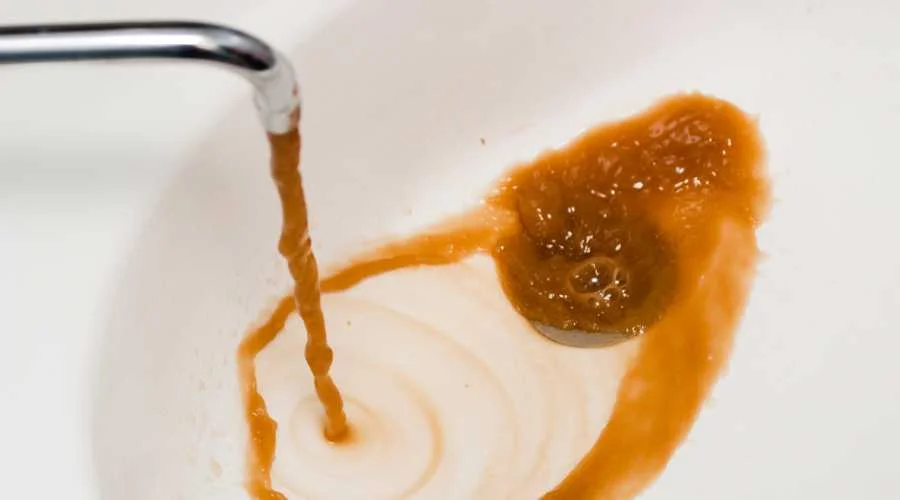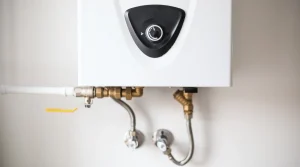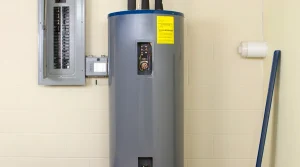We often take the water flowing from our taps for granted. It’s crystal clear, odorless, and safe to drink… Or is it? Despite rigorous municipal water treatment processes in New Jersey, problems can still occur between the treatment facility and your faucet. Aging pipes, water heater issues, or municipal supply problems can all compromise your water quality.
But how do you know when there’s actually something wrong with your tap water?
In this comprehensive guide, we’ll explore the telltale signs of tap water problems, what these symptoms might indicate, and practical solutions to address these issues. Because when it comes to your family’s health, you shouldn’t have to second-guess what’s coming out of your faucet.
7 Warning Signs Your Tap Water Might Be Contaminated
1. Cloudy or Milky Appearance
What it looks like: Your water appears hazy, white, or milky when first poured.
What it might mean:
- Harmless trapped air bubbles
- Excessive water hardness (calcium and magnesium minerals)
- Sediment from corroded pipes
- Particles from municipal water main breaks
Simple test: Fill a clear glass with water and let it sit for a few minutes. If the cloudiness clears from bottom to top, it’s likely just air bubbles – nothing to worry about. If the cloudiness persists, further investigation is needed.
Solution: If your water remains cloudy even after the air bubble test, consider:
- Getting your water hardness tested
- Checking if your water softener is functioning properly
- Having your pipes inspected, especially if you have older plumbing
- Installing a sediment filter at your main water line
2. Metallic Taste or Smell
What it tastes like: Your water has a distinct iron or copper flavor, similar to sucking on a penny.
What it might mean:
- Iron, zinc, or manganese particles in your water
- Corroded pipes leaching metals into your supply
- Water heater sediment (if only hot water is affected)
- Low pH water that’s dissolving metal from pipes
Solution:
- Flush your water heater to remove accumulated sediment
- Have your pipes inspected for corrosion or rust
- Consider installing a whole-house water filtration system
- Test your water’s pH level and address if necessary
3. Chlorine Smell or Taste
What it’s like: Your water smells like a swimming pool or has a bleach-like taste.
What it might mean:
- Normal municipal water treatment (chlorine is used to disinfect public water)
- Temporary increase in chlorination after maintenance work
- Recent “shock chlorination” in the municipal system
Solution:
- Let water sit in an open container for 24 hours to allow chlorine to dissipate
- Use a water pitcher with activated carbon filter
- Install a carbon filtration system at your main water line or point-of-use
4. Rotten Egg Smell
What it’s like: Your water has an unmistakable sulfur or “rotten egg” odor.
What it might mean:
- Hydrogen sulfide gas in your water supply
- Bacteria growth in your water heater
- Contaminated well water (if you’re on a private well)
- Bacterial growth in sink drains (if smell only occurs when running water)
Solution:
- Flush and disinfect your water heater
- Clean sink drains with baking soda and vinegar
- Install a water filtration system designed to remove hydrogen sulfide
- Have your water tested by professionals
5. Residue or Scale Buildup
What it looks like: White chalky residue on fixtures, spots on glassware, or scale buildup in kettles and coffee makers.
What it might mean:
- Hard water (high mineral content)
- Water softener not functioning properly
- High total dissolved solids (TDS)
Simple test: Look for:
- White film on glassware after washing
- Scale buildup around faucets and shower heads
- Reduced water pressure due to clogged pipes
- Soap that doesn’t lather well
Solution:
- Install or repair a water softening system
- Use descaling products for appliances
- Consider a reverse osmosis system for drinking water
6. Discolored Water
What it looks like: Water appears yellow, brown, orange, or even reddish.
What it might mean:
- Rust or iron in your pipes
- Sediment disturbed in water mains
- Recent municipal water work
- Well water containing naturally occurring minerals
When to worry: If discoloration persists for more than 24 hours or occurs regularly.
Solution:
- Run cold water for 5-10 minutes to flush your pipes
- Install a sediment filter or iron removal system
- Have your pipes inspected and potentially replaced
- Contact your municipal water provider if the problem is widespread
7. Strange Colors or Residue in Toilet Tank
What to look for: Check your toilet tank for:
- Blue or green stains (copper)
- Brown or orange stains (iron)
- Pink or reddish slime (airborne bacteria)
- Black spots (mold or manganese)
Why this matters: Your toilet tank provides a clear view of what’s in your water without interference from soaps, cleaners, or previous residue.
Solution:
- Address the specific mineral or contamination identified
- Consider a whole-house filtration system
- Have professional water testing performed
How to Properly Test Your Water Quality
While the signs above can alert you to potential problems, proper testing is essential for conclusive results:
DIY Testing Options:
- Home water test kits – Available at hardware stores, these test for common contaminants
- TDS meters – Measure total dissolved solids, a general indicator of water quality
- pH test strips – Determine if your water is too acidic or alkaline
Professional Testing:
- Local water authorities – Many provide free basic water testing
- Certified laboratories – Offer comprehensive testing for a complete analysis
- Professional plumbers – Can perform on-site testing and recommend solutions
Did You Know? Municipal water providers are required to publish annual water quality reports, also known as Consumer Confidence Reports (CCRs). These reports detail what’s in your water and any contaminants that have been detected.
Long-Term Solutions for Better Water Quality
Once you’ve identified issues with your tap water, consider these long-term solutions:
1. Whole-House Filtration Systems
Benefits:
- Removes contaminants at the point where water enters your home
- Protects plumbing and appliances
- Provides clean water from every tap
Types:
- Sediment filters
- Carbon filters
- Water softeners
- Reverse osmosis systems
- UV purification systems
2. Point-of-Use Filtration
Benefits:
- More affordable than whole-house systems
- Can be tailored to specific water problems
- Easy to maintain
Options:
- Under-sink filters
- Faucet-mounted filters
- Countertop filter pitchers
- Refrigerator filters
3. Regular Maintenance
- Flush your water heater annually
- Replace filter cartridges according to manufacturer recommendations
- Clean faucet aerators and showerheads quarterly
- Have your plumbing system inspected every 2-3 years
When to Call a Professional Plumber
Some water quality issues require professional intervention. Contact BJC Clifton Plumbers if:
- You’ve noticed multiple warning signs described above
- DIY solutions haven’t resolved the problem
- You suspect serious contamination
- You need help selecting and installing the right water treatment system
- Your plumbing is older and may need inspection or replacement
Our team of expert plumbers can:
- Conduct professional water quality testing
- Identify the source of contamination
- Recommend and install appropriate filtration systems
- Replace corroded or damaged pipes
- Provide maintenance for water heaters and water treatment systems
Conclusion: Don’t Compromise on Water Quality
Clean, safe water is essential for your family’s health and wellbeing. While municipal water treatment facilities work hard to deliver safe water to your home, issues can still arise within your own plumbing system.
By paying attention to the warning signs outlined in this article and taking appropriate action, you can ensure that the water flowing from every tap in your home is as clean and safe as possible.
Remember, when it comes to water quality concerns, it’s always better to be cautious than complacent. If you have any doubts about your tap water, don’t hesitate to contact a professional.
Contact BJC Clifton Plumbers for All Your Water Quality Needs
Don’t let water quality concerns keep you up at night. Our experienced technicians can diagnose and resolve any water issues you’re experiencing, providing peace of mind and healthier water for your family.
Call BJC Clifton Plumbers today at (973) 858-5005 for expert assistance with all your water quality concerns.




